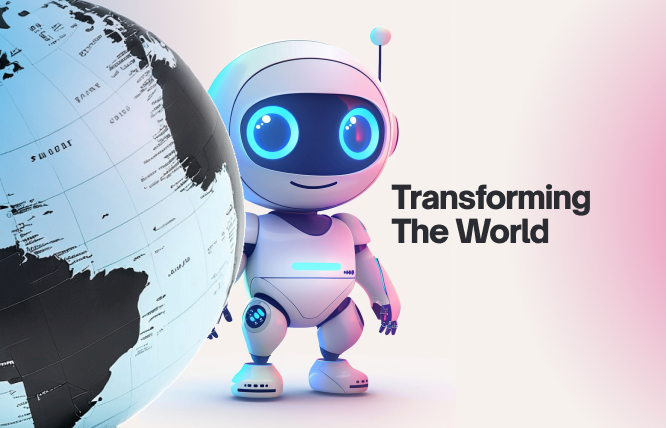Introduction
Artificial Intelligence digital transformation is changing the way businesses operate by automating tasks, enhancing customer experiences, and improving decision-making. AI is driving innovation, efficiency, and competitive advantage.
However, the associated technical challenges and ethical concerns must be addressed for successful AI implementation. By adopting AI, businesses across industries can enjoy new opportunities and shape a more profitable future.
he emergence of Artificial Intelligence is a transformative force in the business landscape, driving efficiency, innovation, and competitive advantage. Businesses across the spectrum are navigating the complexities of the digital age using AI. This is why AI-powered solutions are paving the way for artificial intelligence digital transformation.
Prominent AI Technologies & their Business Applications
| AI Technology | Business Application |
Deep Learning | Complex pattern recognition, speech and image recognition |
Computer Vision | Object detection, image recognition, autonomous vehicles |
Natural Language Processing (NLP) | Chatbots, sentiment analysis, language translation |
Machine Learning | Predictive analytics, fraud detection, customer segmentation |
Artificial intelligence digital transformation is reshaping industries and creating amazing opportunities for businesses. By utilising AI-powered technology solutions for business, companies can tap their maximum potential and steer clear of the competition.
Understanding AI & its Applications
AI is the development of intelligent agents that are systems capable of learning, reasoning, and acting autonomously. AI can be of many types, such as superintelligence, general AI, and narrow AI. Let’s briefly talk about them.
- Narrow AI is also referred to as weak AI. This is designed to perform particular tasks such as recognising faces or playing chess.
- General AI, also known as strong AI, is capable of processing human-like intelligence and can perform intellectual tasks like a human.
- Superintelligence comes as a hypothetical AI type that goes beyond human intelligence in every regard.
AI is associated with many business-related applications, including product development, operations, marketing, and customer service. Custom on demand software development can be used to create tailored AI solutions that emphasise business needs. For instance, we have AI-powered chatbots that offer customer service around the clock, whereas predictive analytics can assist businesses in identifying new market opportunities.
No doubt, AI-powered digital transformation solutions will only get better with time as more businesses across industries are taking an interest in intelligent automation software.
AI’s Impact on Digital Transformation
AI’s integration into digital transformation initiatives is making way for prominent benefits for businesses. As AI automates repetitive processes and tasks, it can improve both productivity and efficiency. For instance, business management system software powered by AI has the potential to decrease costs and streamline operations.
Enhanced Decision-Making: AI plays a big part in improving decision-making by offering data-driven insights. This point is often hinted by those who write on artificial intelligence digital transformation, such as Andrew ng and Geoffery Hinton. Predictive analytics powered by machine learning can assist businesses in forecasting future trends and make informed decisions. This will make way for decreased risk, increased revenue, and better overall customer satisfaction.
Better Customer Experiences: AI has shown amazing potential to revolutionise customer experiences. Custom CMS solutions supported by AI can be utilised to create engaging and personalised digital experiences. Take the example of AI-powered recommendation engines that can suggest products and services as per a buyer’s preferences. Such engines are a great example of how AI in business transformation is a big thing.
AI Adoption – The Considerations & Challenges
Sure, AI is associated with a multitude of benefits. However, businesses must address certain challenges when going with AI-powered solutions.
Addressing the Concerns: AI’s ethical implications are concerning for both governments and organisations. Bias in AI algorithms can cause discriminatory or unfair outcomes. This is why it is important to ensure that AI systems are developed and deployed in an ethical/responsible manner.
AI-related technical complexity is another big challenge. The implementation of AI solutions demands specialised expertise and skills. This means organisations are likely to invest in training and development to attain the required talent.
Furthermore, data availability and quality are important factors for the rightful AI implementation. This is where quality data becomes necessary for training AI models and ensuring accurate results.
Possible Solutions: Businesses should develop a clear AI strategy, invest in AI talent, and address ethical concerns.
Additionally, businesses that are yet to adopt digitisation must understand the difference between digitalization and artificial intelligence. Later on, this can assist them with artificial intelligence digital transformation.
The Future of AI & Digital Transformation
Both AI and digital transformation have a bright future ahead. Since AI technologies are advancing at a rapid pace, many innovative applications are making their way across the business landscape. Custom ERP software development powered by AI will allow organisations to streamline their supply chains and enhance operational efficiency. In a way, this is related to business process optimization with AI as businesses will make great use of AI-powered ERP software
AI-powered microservices management can assist businesses in creating flexible and scalable software architectures. Additionally, AI can transform the world around us in different manners. For instance, it can address some of the most pressing concerns that we have today, such as education, healthcare, and climate change. Besides this, AI-powered medical imaging systems have the potential to do great with disease diagnosis and treatment.
Concluding Remarks
All in all, today’s businesses across industries should look at AI with plenty of optimism. This is because it offers a huge opportunity to drive innovation and gain a competitive advantage. By adopting AI and making good use of its capabilities, a given organisation will stand in a better position to unlock new possibilities and thrive in a highly competitive business environment.
Questions such as “How artificial intelligence is transforming the world?” or “How can AI help my business?” AI can help businesses to achieve their objectives and not just survive but thrive in the modern era.
Finally, if you are an organisation that is looking to make the most out of AI-powered software solutions, then approach FuturByte. We are a reputed software development company that enjoys a global client base. We would love to assess your case and then give you the best AI-powered software solution that best meets your requirements.
Frequently Asked Questions
AI digital transformation takes account of AI’s usage to improve business operations and processes. It can help businesses in becoming more innovative, efficient, and competitive in today’s time.
AI can solve several business problems, such as optimising operations, improving customer service, and making better decisions. Additionally, it can help businesses to develop new products and services.
If you are serious about AI digital transformation, the first thing that you should do is to identify your business-related goals and challenges. Afterwards, you can assess your existing technology infrastructure to decide the most appropriate AI solution. Then, develop an AI implementation plan.
Have questions or feedback?
Get in touch with us and we‘l get back to you and help as soon as we can!



